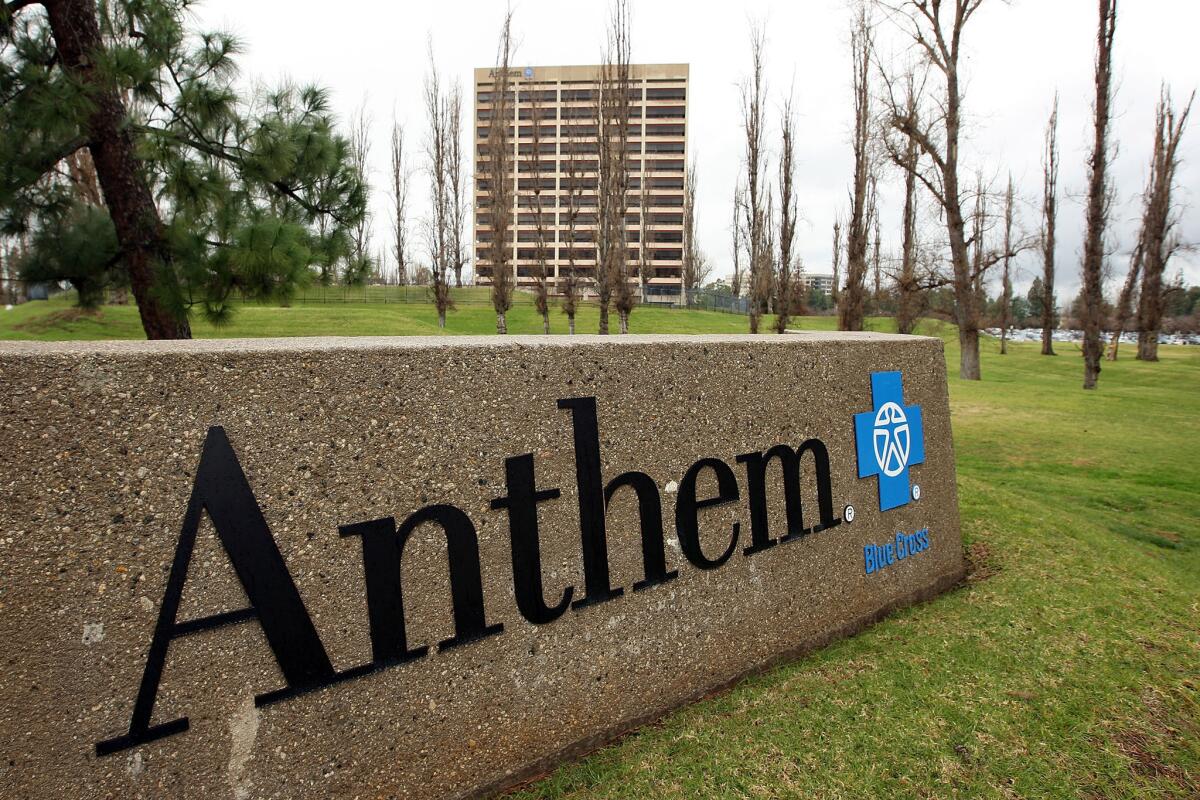Health insurance giants are in a frenzied search for merger partners

Anthem is California’s second-largest health insurer behind HMO giant Kaiser Permanente.
The nation’s biggest health insurers are speed-dating one another, searching for a partner worthy of a multibillion-dollar merger.
Anthem Inc. and other industry giants are flush with cash and eager to swallow up competitors as they increasingly vie for individual customers on Obamacare exchanges and government business tied to Medicare and Medicaid.
As a result, employers and consumers may be left with fewer choices and little relief from ever-rising medical costs, experts say.
The deal chatter started last month with reports of Humana Inc. attracting interest from Anthem, Aetna Inc. and Cigna Corp. The smaller Humana is prized for its strong presence in Medicare Advantage plans, a growing market as baby boomers retire.
Then the merger frenzy hit a fever pitch this week with news that Anthem made a bid for Cigna, the fifth-largest health insurer by enrollment. Not to be counted out, industry leader UnitedHealth Group Inc. made an offer for Aetna, the third-largest health insurer, the Wall Street Journal reported. The health insurers involved have all declined to comment on the possible tie-ups.
When the dust finally settles, some analysts expect the three largest companies — UnitedHealth, Anthem and Aetna — to emerge even stronger. A UnitedHealth-Aetna combination could further narrow the field to two giant publicly traded companies: UnitedHealth and Anthem.
“There are many combinations here. No one wants to be left out of this dance,” said Ana Gupte, a healthcare analyst at Leerink Partners.
The consolidated companies would be able to take advantage of the revenue growth from the Affordable Care Act and the privatization of Medicare and Medicaid, she said.
The health insurance sector has seen its fortunes soar during the health law’s expansion of subsidized, private coverage and Medicaid, the joint state-federal insurance program for the poor.
Shares of Anthem, the nation’s second-largest health insurer, have jumped 85% since January 2014 while the broader stock market has returned 16% for the same period.
Insurers have welcomed the infusion of new members as growth slowed in their conventional employer benefits business.
But rising membership and revenues haven’t translated to fatter profit margins for much of the industry, said Jeffrey Loo, healthcare equity analyst at S&P Capital IQ.
Fitch Ratings analysts said that pressure on profit margins could intensify as federal officials and employers push harder to reduce healthcare costs.
The supersized insurers may be able to use their big numbers to win better terms and lower prices from hospitals, doctors and drug makers. It also may ease the competition on Obamacare exchanges and in bidding for Medicaid managed-care contracts from cash-strapped states.
Whether those savings will be passed on to patients remains unclear.
Some experts are skeptical that this healthcare arms race will address the underlying problems with wasteful medical spending, which accounts for up to 30% of overall costs by some estimates.
“Consolidation invariably leads to higher costs to consumers,” said David Gruber, director of healthcare research at Alvarez & Marsal. “We’ve seen it in medical devices, pharmaceuticals, and hospitals and health systems.”
Loo tends to agree that investors may be the only ones cheering in the end.
“Healthcare premiums keep rising every year, and I don’t see these deals being beneficial to individual consumers,” Loo said.
Anthem is California’s second-largest health insurer behind HMO giant Kaiser Permanente. Anthem, Kaiser and Blue Shield of California dominate the state’s large employer market and the Covered California exchange for individuals.
Those three companies held 78% of California’s employer and individual market in 2012, according to the latest data from Citigroup. UnitedHealth, Aetna and Cigna play a smaller role with a combined 13% of the market.
Anthem’s last major deal came in 2012, when it acquired Medicaid insurer Amerigroup for $4.5 billion. It runs Blue Cross plans in California and 13 other states.
The Indianapolis company had $1.4 billion in cash on its balance sheet as of March, and low interest rates mean taking on debt remains attractive. At recent investor conferences, Anthem executives have struck a bullish tone on acquisitions.
“I like the pricing environment a lot, and we have a lot of capacity to work with to do a cash transaction of meaningful size — and it would be transformative,” Wayne DeVeydt, Anthem’s finance chief, said at a UBS conference last month.
If the bigger companies get swallowed up, attention may shift to mid-size players like Woodland Hills insurer Health Net Inc. and Molina Healthcare Inc. of Long Beach. Both companies could be attractive takeover targets for their experience serving Medicaid patients in California and other states.
Even the prospect of a Supreme Court ruling this month eliminating Obamacare subsidies for millions of Americans hasn’t dimmed the deal talks.
Loo said health insurers appear confident that congressional Republicans will be too fearful of a voter backlash to let premium assistance disappear entirely.
“They figure the Republicans will put forth some stopgap measure,” he said.
Twitter: @chadterhune
Times researcher Scott Wilson contributed to this report.
More to Read
Inside the business of entertainment
The Wide Shot brings you news, analysis and insights on everything from streaming wars to production — and what it all means for the future.
You may occasionally receive promotional content from the Los Angeles Times.











